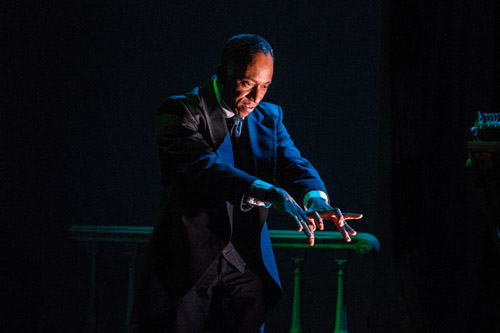
By Eric George Tauber

SAN DIEGO — Anyone who has taken piano lessons for any length of time has put his hands to Scott Joplin’s “The Entertainer”. It takes hours of dedicated practice to master. But once you get the feel of it, it’s a lot of fun to play.
Spawned in the honky tonks of St Louis, ragtime is a blend of European marches and African syncopations that sets your toes tapping. Like all innovations, some found it threatening. Leo Oehlmer in The Musical Observer opined that “A person inoculated with the ragtime-fever is like one addicted to strong drink!” (1914). Harold Hill in “The Music Man” calls ragtime the “shameless music” of “libertine men and scarlet women.” Yet ragtime has come to epitomize the era of silent movies and the bright-eyed hopefuls of Vaudeville in early 20th century America.
These intoxicating syncopated rhythms chose Robert Barry Fleming to give them a new life, which he does through Mo’olelo Performing Arts Company, under the direction of George Ye, at the 10th Ave. Center for the Arts through Oct. 12.
More than a biography play, Scott Joplin’s New Rag is “a contemporary meditation on Joplin’s historical legacy. … Spoken word, hip hop and live ragtime music propel this theatrcal exploration into the mind and music of this genius who lived during a Gilded Age which only glittered for some.” (Press Release) A gifted and animated storyteller, Fleming embodies Joplin and other characters that come in and out of his life. Classically trained, Fleming speaks with beautiful clarity, adding his own poetry slam style rhyming couplets and rave dance moves. The effect of going back and forth between two centuries was a bit jarring, yet adds an electricity that crackles.
The King of Ragtime, Scott Joplin was a flawed man who fell and flew. He was born in Post-Reconstruction Texas. In spite of emancipation, “colored” people were expected to “know their place”. Reprimands were sharp and swift if they did not. His piano teacher, Julius Weiss, was no stranger to race hatred himself. As a German Jew, he was often slapped and called a “Christ-killer.”
Like many great artists, Joplin’s personal life was tragic with multiple marriages and children dying in infancy. His professional life was no less so. His skin color made him an easy target for swindlers and double-dealers. He swore that the melody of “Alexander’s Rag Time Band” -Irving Berlin’s first big hit in 1911- was stolen from him.
When President Theodore Roosevelt invited the acclaimed Booker T. Washington to dine at the White House, it caused quite a stir. Racist “dixiecrats” were aghast that a common n***r would be given such an honor. Joplin wrote his first rag time opera, “A Guest of Honor” to commemorate the event. …But copies were confiscated to pay his debts and then “lost”.
Like the music, David Weiner’s set is playful and simplistic. An upright piano sits center stage strewn with sheet music. Two other sets of piano guts are laid bare and the haunting sound of the strings is incoporated into the score. The backdrop is a canvas of shifting images using silent movie text frames to set up the scenes.
With thanks to one generous patron, students from Patrick Henry High School were in the house helping the souls of a new generation be touched by the rhythms of a bygone era.
If you would like to set your toes tapping and let your soul be touched by a true American tragedy, come see Robert Barry Fleming in Scott Joplin’s New Rag at the 10th Ave Center for the Arts.
*
Tauber is a freelance writer who specializes in coverage of the arts. He may be contacted at eric.tauber@sdjewishworld.com